
Dermanura is a genus of leaf-nosed bats.

Rosenberg's treefrog, also known as Rosenberg's gladiator frog or Rosenberg's gladiator treefrog, is a species of frog in the family of tree frogs (Hylidae) and genus of gladiator frogs (Boana) found in Costa Rica, Panama, Colombia, Trinidad and Tobago and north-western Ecuador. Its scientific name is a testimony to Mr. W. F. H. Rosenberg who collected the type series, and its common name refers to the aggressiveness of males of the species.

The Chocó poorwill is a species of nightjar in the family Caprimulgidae. It is found in Colombia and Ecuador.
Rosenberg's fruit-eating bat is a species of bat in the family Phyllostomidae. It is found in humid tropical forests in the El Chocó region on the coast of western Colombia and northwestern Ecuador at altitudes below 500 m. Until recently it was included within D. glauca, a canopy frugivore that also eats insects. It was elevated to full species status in 2009. The specific name is in honor of collector W. F. H. Rosenberg. The species is regarded as common, but is likely threatened by the deforestation of its habitat.

The Rosenberg's monitor is an Australian species of varanid reptile found in southern regions of the continent. They are large and fast predators with rugged bodies and long tails, having a combined length up to 1.5 metres, that will consume any smaller animal that is pursued and captured or found while foraging. They occur in the Australian Capital Territory, New South Wales, South Australia, Victoria, where it may be rare or locally common, and more frequently observed in Western Australia, where it is sometimes abundant.
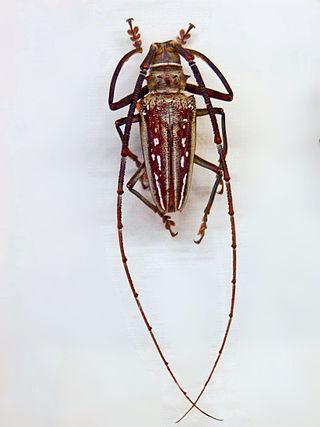
Batocera wallacei, common name Wallace's long-horn beetle, is a species of flat-faced longhorn beetle in the subfamily Lamiinae of the family Cerambycidae. The species name honors Alfred Russel Wallace, who discovered this longhorn beetle on the Aru Islands in Indonesia. It was named after him by James Thomson in 1858.

Batocerini is a tribe of longhorn beetles of the subfamily Lamiinae.

Batocera maculata is a species of flat-faced longhorn beetle in the subfamily Lamiinae of the family Cerambycidae. While originally named as "Lamia tigris" by Voet in 1778, no name was validly published for this species until 1817; Voet's 1778 work fails to fulfill the requirement in ICZN Article 11.4 that a work must be consistently binomial, and all names within that work are unavailable.
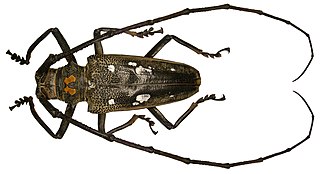
Batocera celebiana is a species of beetle in the family Cerambycidae. It was described by Thomson in 1858. It is known from Java, the Moluccas, and Sulawesi. It contains the subspecies Batocera celebiana pierrotae.
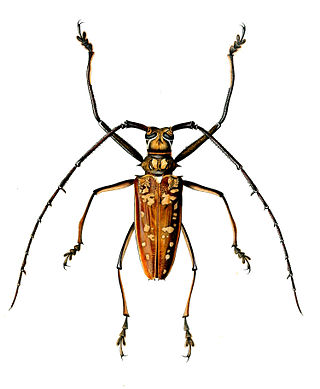
Batocera victoriana is a species of beetle in the family Cerambycidae. It was described by Thomson in 1856. It is known from Borneo, India, Laos, the Philippines, Malaysia, Vietnam, and Sumatra. It contains the varietas Batocera victoriana var. velleda.
Batocera frenchi is a species of beetle in the family Cerambycidae. It was described by Van de Poll in 1886. It is known from Australia. Batocera frenchi is one of the species which caused the cane toad to be brought into Australia in June 1935.
Batocera gigas is a species of beetle in the family Cerambycidae. It was described by Drapiez in 1819. It is known from Java, and is very common.

Batocera lamondi is a species of beetle in the family Cerambycidae. It was described by Rigout in 1987. It is known from the Solomon Islands.

Batocera lineolata is a species of beetle in the family Cerambycidae. It was described by Louis Alexandre Auguste Chevrolat in 1852. It is known from China, Korea, Japan and Taiwan.
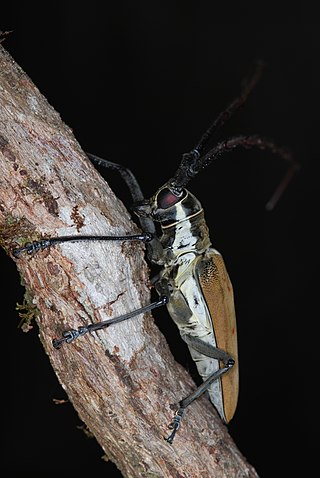
Batocera numitor, the mango-tree longicorn borer, is a species of beetle in the family Cerambycidae. It was described by Newman in 1842. It is known from China, Java, India, Laos, Nepal, Myanmar, the Philippines, Sulawesi, Sri Lanka, Thailand, Sumatra, and Vietnam. It feeds on plants including Mangifera indica and Quercus griffithii.
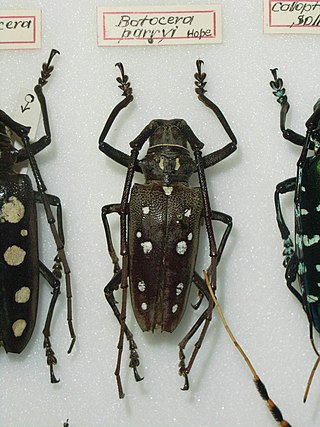
Batocera parryi is a species of beetle in the family Cerambycidae. It was described by Hope in 1845. It is known from China, India, Laos, Java, Myanmar, Malaysia, Sumatra, and Vietnam.

Batocera rubus is a species of beetle in the family Cerambycidae. It was described by Carl Linnaeus in his landmark 1758 10th edition of Systema Naturae. It is known from Japan, China, Java, India, Laos, Myanmar, Malaysia, the Philippines, South Korea, Taiwan, Sumatra, Thailand, and Vietnam. It feeds on Ficus carica, Ficus elastica, and Mangifera indica.

Batocera rufomaculata is a species of long-horn beetle in the family Cerambycidae. It was described by Charles De Geer in 1775. It is native to China, India, Laos, Malaysia, Myanmar, Pakistan, Sri Lanka, and Thailand, and has been introduced to many other countries, including Israel, Jordan, Lebanon, Madagascar, Mauritius, Puerto Rico, Réunion, Syria, and the Virgin Islands.
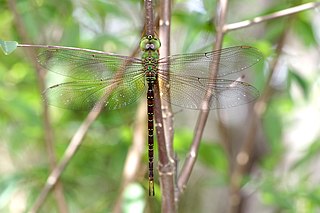
Gynacantha rosenbergi is a species of dragonfly in the family Aeshnidae, known as the grey duskhawker. It inhabits still waters and is found in New Guinea, Indonesia, through parts of northern Australia, as well as islands in the south Pacific.

Delias rosenbergii, Rosenberg's painted Jezebel, is a butterfly in the family Pieridae. It was described by Samuel Constantinus Snellen van Vollenhoven in 1865. It is found on the Wallace line. The name honours William Frederick Henry Rosenberg.
















